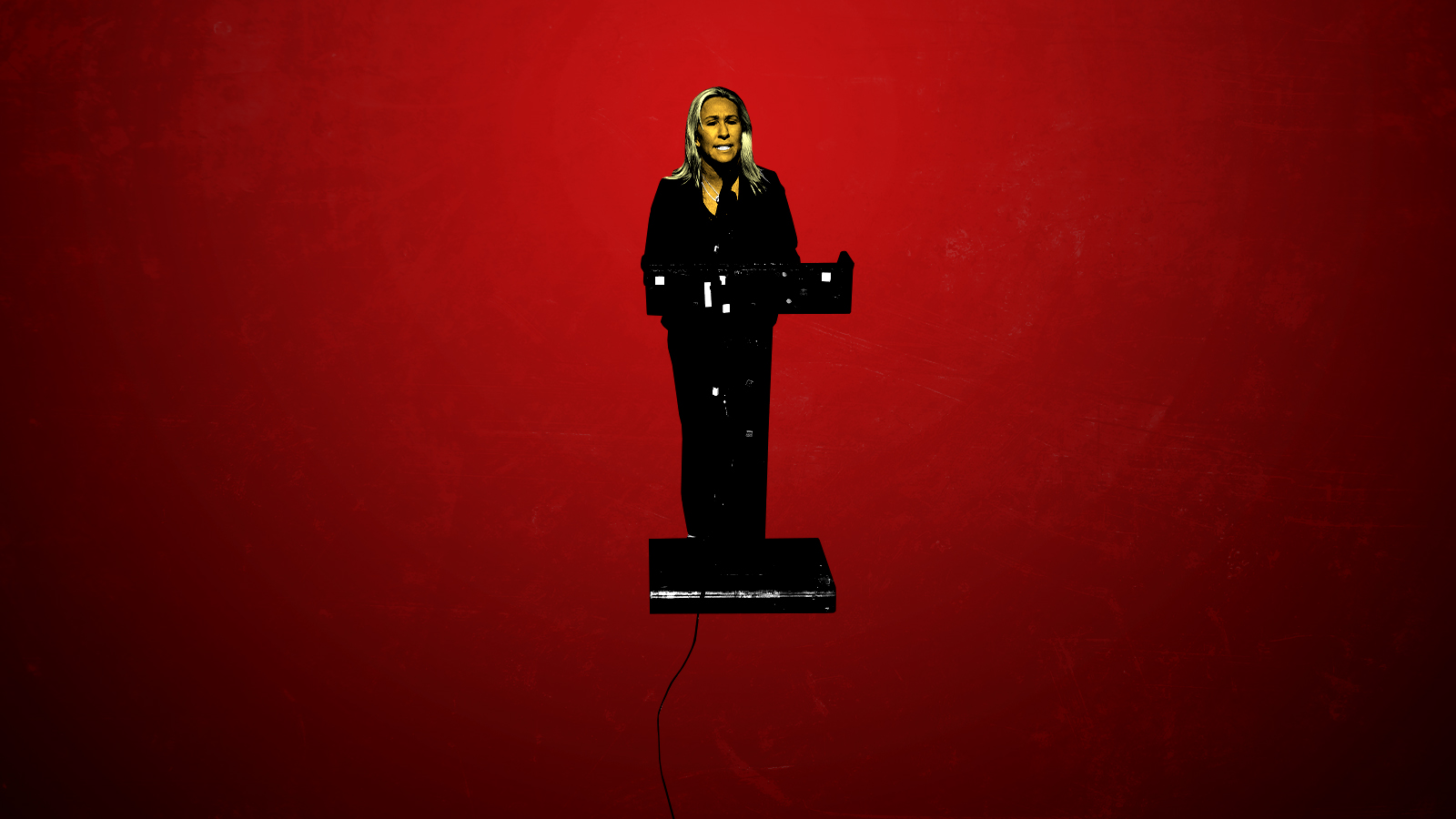The other problem with Marjorie Taylor Greene's Nazi analogy


A free daily email with the biggest news stories of the day – and the best features from TheWeek.com
You are now subscribed
Your newsletter sign-up was successful
The decision of House Speaker Nancy Pelosi (D-Calif.) to retain a mask mandate for representatives who haven't been vaccinated against COVID-19 is just like the Holocaust, Rep. Marjorie Taylor Greene (R-Ga.) claimed in a television appearance Friday. "We can look back in a time in history where people were told to wear a gold star, and they were definitely treated like second-class citizens — so much so that they were put in trains and taken to gas chambers in Nazi Germany," Greene said, "and this is exactly the type of abuse that Nancy Pelosi is talking about."
It's not, and Greene has been widely upbraided for her remarks, including by several fellow Republicans. Many of these condemnations rightly focused on how Greene's words trivialize unthinkable suffering: "Comparing wearing masks to the abuse of the Holocaust is a not-so-subtle diminution of the horrors experienced by millions," said former Virginia Rep. Denver Riggleman (R) in a representative critique.
That's certainly true, but there's another problem with the Nazi analogy, too: Once you analogize your enemy to Adolf Hitler, you have all but invited violence. "There's nowhere to go from Hitler," observes journalist Matt Taibbi in Hate Inc., his book on political media. "It's a rhetorical dead end. Argument is over at that point. If you go there, you're now absolving your audiences of all moral restraint, because who wouldn't kill Hitler?"
The Week
Escape your echo chamber. Get the facts behind the news, plus analysis from multiple perspectives.

Sign up for The Week's Free Newsletters
From our morning news briefing to a weekly Good News Newsletter, get the best of The Week delivered directly to your inbox.
From our morning news briefing to a weekly Good News Newsletter, get the best of The Week delivered directly to your inbox.
As Taibbi's brief accounting of recent use of this metaphor reiterates, Greene is far from alone in her indefensible jump to the Hitler comparison. In his days as a Fox News pundit in the early 2000s, Glenn Beck was particularly bad about this. Turning his fire leftward, Taibbi argues that, a decade later, the center-left media's "conventional wisdom was that [former President Donald] Trump was Hitler" and all his voters were "racist, white nationalist traitor-Nazis." From either side, the Nazi analogy is a "sweeping, debate-ending dictum," Taibbi concludes, and in "the fight against Hitler, everything is permitted."
I suppose one might fairly analogize a present-day genocide to the Holocaust, but in that case, an analogy hardly seems necessary. In domestic politics, however, the Nazi metaphor should be used with extreme parsimony, if at all. That's particularly true in a time like ours, when our norms against political violence are already under strain.
A free daily email with the biggest news stories of the day – and the best features from TheWeek.com
Bonnie Kristian was a deputy editor and acting editor-in-chief of TheWeek.com. She is a columnist at Christianity Today and author of Untrustworthy: The Knowledge Crisis Breaking Our Brains, Polluting Our Politics, and Corrupting Christian Community (forthcoming 2022) and A Flexible Faith: Rethinking What It Means to Follow Jesus Today (2018). Her writing has also appeared at Time Magazine, CNN, USA Today, Newsweek, the Los Angeles Times, and The American Conservative, among other outlets.
-
 The ‘ravenous’ demand for Cornish minerals
The ‘ravenous’ demand for Cornish mineralsUnder the Radar Growing need for critical minerals to power tech has intensified ‘appetite’ for lithium, which could be a ‘huge boon’ for local economy
-
 Why are election experts taking Trump’s midterm threats seriously?
Why are election experts taking Trump’s midterm threats seriously?IN THE SPOTLIGHT As the president muses about polling place deployments and a centralized electoral system aimed at one-party control, lawmakers are taking this administration at its word
-
 ‘Restaurateurs have become millionaires’
‘Restaurateurs have become millionaires’Instant Opinion Opinion, comment and editorials of the day
-
 Epstein files topple law CEO, roil UK government
Epstein files topple law CEO, roil UK governmentSpeed Read Peter Mandelson, Britain’s former ambassador to the US, is caught up in the scandal
-
 Iran and US prepare to meet after skirmishes
Iran and US prepare to meet after skirmishesSpeed Read The incident comes amid heightened tensions in the Middle East
-
 Israel retrieves final hostage’s body from Gaza
Israel retrieves final hostage’s body from GazaSpeed Read The 24-year-old police officer was killed during the initial Hamas attack
-
 China’s Xi targets top general in growing purge
China’s Xi targets top general in growing purgeSpeed Read Zhang Youxia is being investigated over ‘grave violations’ of the law
-
 Panama and Canada are negotiating over a crucial copper mine
Panama and Canada are negotiating over a crucial copper mineIn the Spotlight Panama is set to make a final decision on the mine this summer
-
 Why Greenland’s natural resources are nearly impossible to mine
Why Greenland’s natural resources are nearly impossible to mineThe Explainer The country’s natural landscape makes the task extremely difficult
-
 Iran cuts internet as protests escalate
Iran cuts internet as protests escalateSpeed Reada Government buildings across the country have been set on fire
-
 US nabs ‘shadow’ tanker claimed by Russia
US nabs ‘shadow’ tanker claimed by RussiaSpeed Read The ship was one of two vessels seized by the US military
